by Angelica | Jan 5, 2016
Happy New Year! The end of each year and the beginning of the next always causes me to become a bit sentimental. Somehow, this rather arbitrary marker always makes me stop and think about where I am and where I’m going.
The new year always comes in the middle of the school year, and I can’t help but feel that this January marks the beginning of an end. In eleven short weeks, I’ll take my last M2 exam and begin boards study period (the USMLE Step 1 Licensing Exam, which strikes varied emotions in M2s). Then, at the beginning of May, I’ll start M3 orientation and then my first clinical rotation. Time is moving way too quickly. I still feel as if I don’t know enough, and I know this is a common feeling. We’ve learned a lot, but there is always so much more to learn.
Since the last time I wrote, we completed our musculoskeletal and dermatology blocks. It felt like the three weeks passed in a flash, and then it was break. I started break with brunch with some med school friends, and then headed back to my hometown to spend time with family and friends. I loved spending time at home, meeting with friends, and even getting a chance to go see the new Star Wars movie with my family. Far too quickly, I had to head back to Ann Arbor to get ready for the start of the new semester.
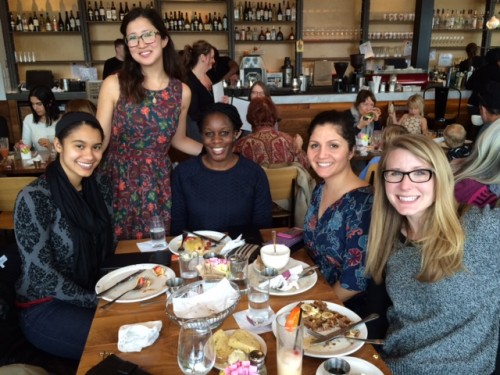
Brunch at Zola Bistro with my favorites
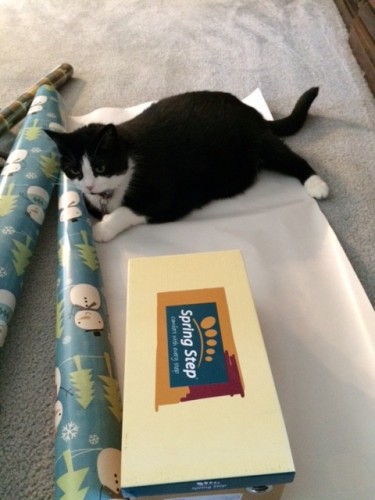
I had so much help wrapping presents.
I’ve realized that moving forward also generally means giving some things up, as well. In December, I ended my time as a patient scheduler for the Student-Run Free Clinic, as the new M1 clinic staff officially took over clinic. I had put off writing about it because I never really thought I could do it justice. My time at the UMSRFC was one of the highlights of my medical education thus far, and it’s difficult to know that I won’t have as much of a role going forward.
The goal of the clinic is to provide quality health care for individuals in Livingston County who wouldn’t otherwise have access to health services. The clinic began a few years ago, the dream of a group likeminded medical students who felt the injustice of health inequities and wanted to do something about it. UMSRFC has faced many challenges since, including a fire that displaced the clinic. However, the clinic, its alumni, and its advisory board remain committed to providing quality care. The UMSRFC is unique in that students run almost every aspect of the clinic, including ordering supplies, fundraising, managing finances, and scheduling patients, physicians, and student volunteers. Members of the clinic staff spend about one Saturday per month staffing the clinic in addition to their everyday responsibilities.
The logistics of the clinic don’t do justice to the lessons that we learn from patients, however. Just like people in general, some patients are pleasant, and others require slightly more patience. The stories that I’ve heard from patients have made my heart sing, made my blood boil, and brought me to tears. Above all, my time at the clinic has confirmed my desire to work with underserved populations and has given me the experience of being in a group of very passionate people who are taking small steps toward making change. While I’m now a leadership alumna, I know that I’ll be back at the clinic as a clinical student M3 and M4 year, so it’s never over until it’s over.
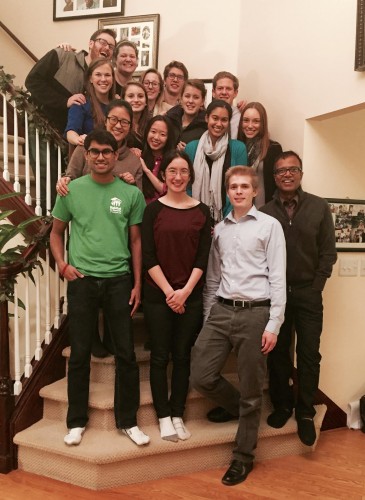
Class of 2018 UMSRFC leadership
Yesterday, we started our Hematology/Oncology block, the first of five blocks before the end of M2 year. I have to say that the adjustment back into studying all day was a rough one. I’m excited to move forward and excited for what is to come. For now, however, it’s back to the grind and happy reunions with friends. As always, thanks for reading. Until next time, try to stay warm!
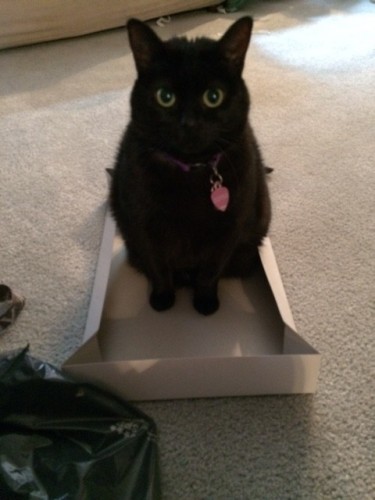
She thinks that she's the best present of all.
Angelica is a fourth-year medical student at the University of Michigan Medical School. When she’s not on the wards, you can find her on a run around Ann Arbor or passionately discussing medicine and public health over tea.
by Angelica | Nov 28, 2015
Happy Thanksgiving and end of November! I feel like I blinked and almost two months have passed. They have been a very busy two months, where we wrapped up renal, had two Clinical Foundations of Medicine (CFM) weeks, had a week of psych, and then completed the infamous neuro sequence.
CFM was especially great this time around because we were able to take electives. One of my electives was about labor and delivery from a primary care perspective. We learned how to do ultrasounds, caught sim babies in simulated birth scenarios, performed a simulated C-section, and learned how to tie knots and suture. I absolutely loved it!
After CFM, psych was a quick jolt back into the reality of med school. It was an interesting block, as we quickly realized that everyone has some of the characteristics we learned about (it’s okay because there’s really only a problem if the tendencies or characteristics start to affect an individual’s daily life function). For example, about 100% of my class has some form of obsessive-compulsive tendencies (making lists and memorizing lists of facts… sounds familiar), but then again, these are necessary survival skills for med students.
After a quick week of psych, neuro hit us like the proverbial ton of bricks. The M2 neuroscience sequence is notorious at UMMS. If the 1000+ page course pack wasn’t scary enough, the quizzes and exam were also rumored to be very challenging. On day one, I was terrified because after the first lecture of the day, I realized how much I had forgotten from neuro last year and how much I would have to learn over the next three weeks. I also quickly found that the study method that I had “perfected” over the past year wasn’t working this block. But luckily last year, I learned that if my study methods weren’t working, I should change them quickly instead of self-destructing, so things worked out a lot better this year. I don’t think I’ve ever studied quite as hard as I did for this block, but it paid off in big ways. While I was a big mess of anxiety during the entire block (and even questioned my life choices once or twice), now that it’s over, I can look back and appreciate that I was challenged in a very significant way, and I made it.
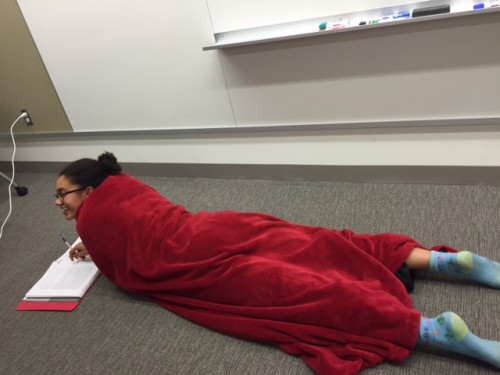
Sometimes I get tired of sitting at tables while studying...
Now, I’m in the midst of four days of freedom before musculoskeletal and rheumatology starts on Monday. I’ve spent the last couple of days at my parents’ house in Spartan Country (sometimes we can’t help where we come from), and today’s game DEFINITELY will not be helping with the harassment I get every time I wear Michigan gear and all of the offers I receive for tickets to the MSU games to be able to watch “a team that beat Ohio state”. If there ever was a time for an eye-rolling emoji, it would be now.
I think I’m enjoying catching up with family and friends a little too much, and it will definitely be difficult to focus for the three weeks between Thanksgiving break and Christmas. However, my to-do list before the next break is a mile long, so I’ll definitely have to get the focus back soon.
That’s all for now. As always, thanks for reading, and I hope that you can enjoy the last few days of November!
Angelica is a fourth-year medical student at the University of Michigan Medical School. When she’s not on the wards, you can find her on a run around Ann Arbor or passionately discussing medicine and public health over tea.
by Angelica | Oct 1, 2015
Happy fall and hello kidney (we’re in our renal sequence)! The school year was about to start when I last wrote, and I feel like it has been non-stop ever since. After finishing my summer research (temporarily), I took a quick vacation, and then headed back to Ann Arbor for school. The day before school started, my friends and I gathered for brunch to celebrate a birthday and to catch up before school started again. Many of my friends spent the summer abroad, so it was really great to hear their travel stories.
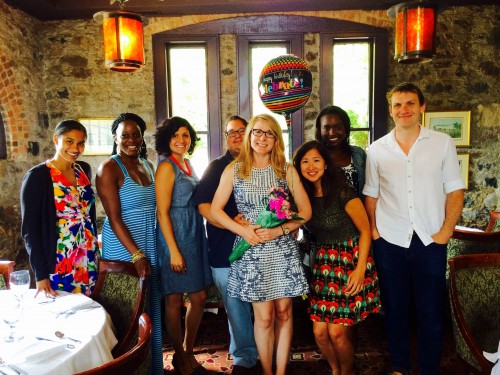
Sunday Brunch at the Gandy Dancer
The next day, we definitely hit the ground running with our cardiovascular sequence. I quickly noticed two things about the difference between M1 and M2 year. First, there is a lot more lecture M2 year. Second, the material is very different than M1 year in a good way. Last year, we learned normal systems, but this year, we’re learning what happens when things go wrong, and it’s a lot more interesting, in my opinion. We’re learning about how diseases affect the body and the drugs we use to treat them. We even got a quick intro to reading EKGs. I’m starting to feel a lot more like a medical student, but I’m also quickly realizing that there is so much that I still don’t know. It’s a process, though, and the knowledge acquisition will continue for the rest of my career.
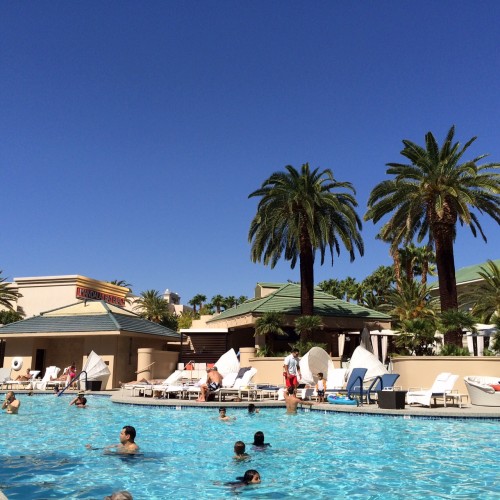
It was a little hard to focus on cardio when I had spent the previous week in the sun
We clipped through cardio and moved onto respiratory and then to renal. I can’t believe that we’ve been here for almost seven weeks already. I’ve noticed that I’m a lot busier this year than last, but I still try to keep up with some of the things I care about. We have selected the new leadership team for the Student-Run Free Clinic, and we’re beginning to train them. I can’t believe that this time last year, I was just beginning my time at the clinic. Some of my most meaningful moments during medical school have occurred at clinic, so it’s difficult to see my time there coming to an end. Alas, that will be another post.
I’ve also been participating in the Clinical Reasoning Elective (CRE), an M2 elective that allows us to work in teams to do histories and physicals on patients in the Emergency Room or on the Internal Med service. Since my preceptor works in both settings, I’ve had an especially varied experience, and I have really enjoyed seeing how patients are treated acutely and more long-term. I also love having a small taste of what next year will be like, and I always leave the wards incredibly excited for what is to come.
In addition, two weekends ago, we had Fall Ball, and since some of my friends couldn’t make it last year, we decided to go again. It was fun to get dressed up and dance the night away at what we jokingly call Med School Prom.
Given that we don’t have a quiz this weekend (the occasional quiz-free weekend is one of the many perks of M2 year), I’ll be outside enjoying the suddenly slightly nippy fall weather. I’m thinking there may be hot apple cider in my future.

One more vacation picture because mountains and sunsets are my favorites
As always, thanks for reading! Until next time, here’s to fall!
Angelica is a fourth-year medical student at the University of Michigan Medical School. When she’s not on the wards, you can find her on a run around Ann Arbor or passionately discussing medicine and public health over tea.
by Angelica | Jul 24, 2015
When I woke up this morning, I realized that there are just over 3 weeks until M2 year begins. The recent weeks have been full of public health research, exercise, travel, and relaxing. It has been really great. I’m doing social epidemiology research, and I love being back at the School of Public Health and surrounded by people doing fascinating research. When I’m not researching, I’ve been enjoying the summer and have spent as much time outside as I can.

http://publichealthmemes.tumblr.com/
With all of the extra free time, I’ve had a chance to be rather sentimental about all of the things that I have learned in the past year. After all, in a little over a week, the new class of M1s will be receiving their white coats, marking almost a solid year that I’ve been at Michigan Med. I look back at where I was last year versus this year, and I realize that I have learned a lot. I notice it in small ways in my position in the Student-Run Free Clinic, as I now have a better idea of the questions I need to ask patients to get the information I need from them, and I am more attuned to the times when I need to contact the medical director about a particularly concerning condition. At the same time, other situations make me realize that I have so much more to learn. In addition to the knowledge acquisition, I have also grown as a person because it turns out that medical school is about more than learning everything in a textbook.
Thus, I decided to share ten of the lessons that I’ve learned during my first year of med school. I promise that being succinct is still not one of them, but I’m working on it, so hang in there during this very long post.
It’s okay to try new things.
This one was a bit hard for me at first, and I don’t think that’s abnormal. How many times have we heard the phrase, “Humans are creatures of habit”? It’s kind of true, but it turns out that we miss a lot if we stay inside our comfort zones all of the time. In the past year, I’ve tried new things, like running a half marathon, dancing in front of an audience, and trying new restaurants, among many other things. Shaking things up keeps life interesting, and it has definitely led to some really fun experiences.
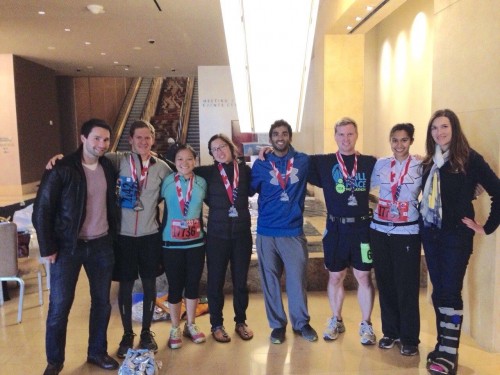
Photo credit to Grace
If your study method doesn’t work, find a new one. Repeat until you find one you love and then trust your method.
This one is pretty self-explanatory, but I, like everyone else, came in with a study method that worked for me in undergrad. Unfortunately, that method did NOT work in medical school. It took some trial and error, but I came up with a method I love and that works for me. So now I’ll stick with it until it no longer works.
Stay humble.
One of the most important things that the students ahead of me have told me is to stay humble. When things are going well, it’s so easy to become overconfident, but that can be really dangerous for the patients. I try to constantly remind myself of what a privilege it is to be here, and when I forget, I am lucky enough to have a group of people who remind me. Humility doesn’t seem like a big deal, but it can save lives, not to mention your patients and the members of your team will appreciate it.
Figure out what drives you.
Motivation can come from many different sources and is very person-specific. I was fortunate enough to begin med school with a pretty good picture of what motivates me based on my background and many of the activities I participated in during undergrad and grad school. To put it as succinctly as possible, health inequity drives me. The fact that some of the populations that I’ve worked with are never given a fighting chance due to disparities in health care and education is what keeps me awake at night, what pushes me out of bed in the morning, and what determines the activities I’m involved with. Find what motivates you and hang onto it because some days will be difficult, and you’ll definitely need the reminder of why you came to medical school in the first place.
This is a sacrifice, but it will be worth it.
Since I took two years out between undergrad and medical school to go to grad school, many of my friends experienced at least the first couple years of med school before me. They had told me many times of the sacrifice involved, but it was easy to convince myself that they were exaggerating or just overly exhausted and complaining. It turns out that sometimes they were doing these things, but it also turns out that there is a lot of sacrifice involved in this process, as there must be. In a few short years, people will trust us with their lives, and that is an incredible responsibility. Thus, there are sacrifices that we must make. For me, the hardest one has been not being able to see my family and friends as much as I’d like. However, I’m fortunate to have friends and family who are supportive of my pursuits and who understand that sometimes I won’t be able to make it to events or that I may have to cancel plans. They, as well as I, know that this is temporary but necessary, and it will definitely be worth it on the other side.
Find your people.
Your support system is absolutely and unequivocally what will get you through medical school, so it’s very important to have a good one. Everyone’s support system looks different, but they are important nonetheless. Mine is a mix of family, friends from home, college, and grad school, my friends/study group at school, the members of the Black Medical Association (BMA), and mentors from the various stages of my education. These are the people I talk to when I’m having my best and worst days, and they’re the ones who have gotten me through the year.
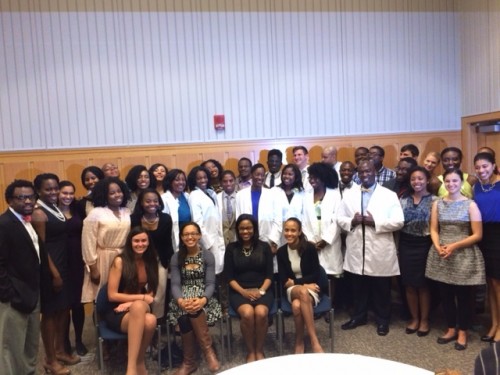
The BMA fam!
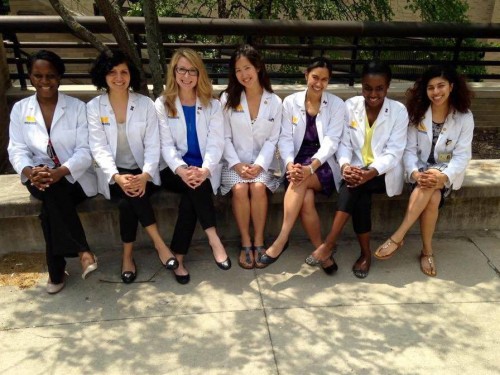
Since we always studied in the lounge in Old Mott, we started to call ourselves the Mottley Crew. I don't know what I would do without these wonderful people!
Things won’t always go as planned, and that’s okay.
So many of us started med school with this grand plan and the idea that everything would go perfectly. False. There are bumps along the road, and flexibility is an incredibly important trait to have as a physician (because illnesses almost never read the text book). Last year, I learned that sometimes I could make the best study plan and it just wouldn’t work out. Other times, I learned that sometimes I just needed a day off, and I’d have to readjust my study plans for the rest of the week. Flexibility is key because stressing yourself out over things you can’t control is definitely a waste of time (and you never want to waste time).
It’s okay to ask for help.
It’s not only okay—it’s crucial. However, so many med students went through school always understanding everything and never really having to ask for help, but there are times in medical school when you just don’t know. At these times, it’s so important to ask for help, whether from classmates, faculty, or others. This will be especially important later on the wards because patients can really suffer if you don’t know what you’re doing and you don’t ask for help. It may take some humility initially, but you may be surprised that people are often more than happy to teach you and are often glad that you asked… not to mention that others often have the same issue but are afraid to ask.
You’re still a person and that’s okay.
This may mean that sometimes you need a day off, so take a day off or push through until you can. There are also times that you’ll have a really emotional encounter with a patient or something bad will happen in your life outside of medical school. At these times, it’s so important to take care of yourself. As much as I’d love to have the efficiency of a robot, that’s not the case sometimes. However, I figure that the fact that I am aware that I’m still a person will make me a better physician down the road.
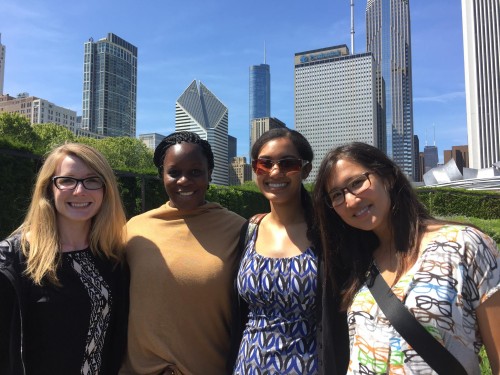
Sometimes you just need a quick weekend away with good friends.
There isn’t anything else in the world I’d rather do than medicine and public health.
If there was anything else I’d rather do, I would be doing it, but there isn’t. While I was still in undergrad, one of my advisors said that if there was anything else that I’d rather be doing in the world besides medicine, I should do it. After doing a lot of soul searching, I decided that the combination of public health and medicine was exactly what I wanted to do with the rest of my life. There was nothing else that could make me as happy or fulfilled, and that was when I knew this was the path I should take. Throughout the year, this decision has been reaffirmed for me many times. Yes, there are some days where I question the decision, but I always know deep down that this is the right one and that I wouldn’t be nearly as happy doing anything else. It’s one of the best feelings I’ve experienced.
As always, thanks for reading. I’m off to enjoy another lovely summer weekend. Best of luck to the M0s who officially become M1s in a little over a week!
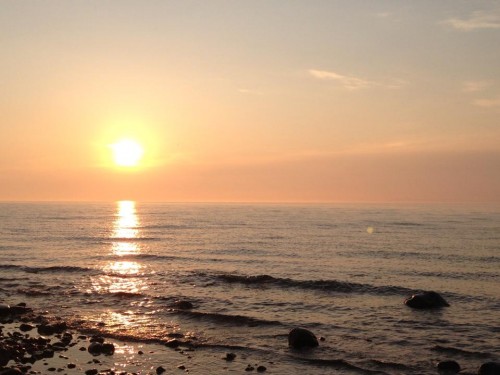
Beautiful Lake Michigan sunset
Angelica is a fourth-year medical student at the University of Michigan Medical School. When she’s not on the wards, you can find her on a run around Ann Arbor or passionately discussing medicine and public health over tea.
by Angelica | Jul 13, 2015
Hey there summer! It’s hard to believe that summer is finally here. The last few weeks of school were busy, but there was also time for some fun.
The end of ID came with a bit of sadness and a sigh of relief. While the block involved a great deal of studying, it was also really fun. I loved the detective work of ID, figuring out what illness patients had and what the best treatment would be. At the same time, five-week blocks are always a bit intimidating because of the amount of knowledge we must acquire by the time we take the exam. However, all was well, and we ended our last multi-week sequence of the year.
The next week, we jumped right into Clinical Foundation of Medicine (CFM) weeks. The big focus of this CFM block was taking a history and performing a physical exam. These are huge components of most fields of medicine, so it’s really important to learn how to take a thorough history and perform a physical exam (H&P). After all, these are the skills that will help us figure out what is ailing our patients. The weeks culminated with our CFM instructors watching us perform an H&P and giving us feedback. My friends and I spent the week practicing our H&Ps on each other, and all of the practice paid off in the end.
CFM weeks are also a time for fun. The first weekend was Biorhythms and a quiz-free weekend! During the winter biorhythms show, I watched my friends perform, and they convinced me that I had to do the spring show. I didn’t regret it at all! I was part of the lyrical dance, and we performed to Ben Folds’ “The Luckiest.” Our talented choreographer, Megan, created a beautiful piece, and it was great to show off our hard work during the show.
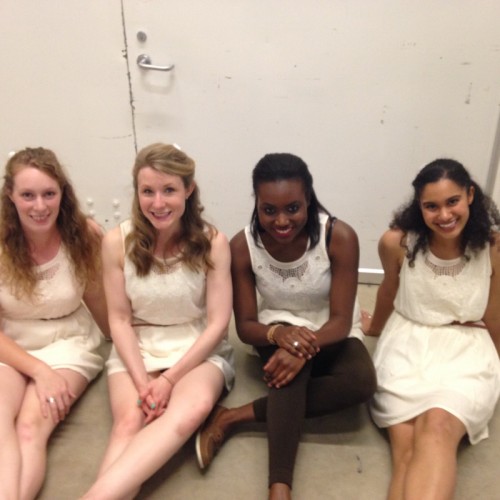
I am the luckiest to have friends like these!
The second CFM weekend, we had a take-home exam, and it was also Memorial Day Weekend, so many of us spread around the country for the long weekend. I headed to Chicago for the weekend, and I had a great time running along the lakeshore, eating great food, and enjoying the sunshine.

Millennium Park and the lakeshore from the roof of the Chicago Athletic Association.
On the Tuesday after Memorial Day, we started our last block of the year, Human Growth and Development. It was a four-day block, but it was packed with lectures and small groups about the different stages of childhood, adolescence, and old age. We had one last exam, and then we were done for the summer.
I can’t believe that the year is over already. It’s also hard to believe that this is our last summer, as we will be on the wards at this time next year if all goes as planned. That’s so strange to think about but very exciting at the same time. For now, I’m going to enjoy the warm weather, sun, and summer festivities in Ann Arbor. As always, thanks for reading! Until next time, go out and enjoy the sun (but wear sunscreen)!
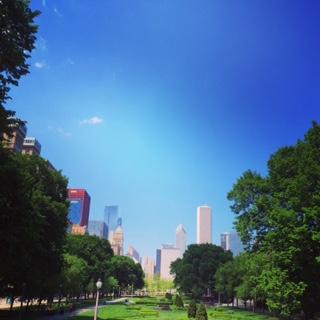
Angelica is a fourth-year medical student at the University of Michigan Medical School. When she’s not on the wards, you can find her on a run around Ann Arbor or passionately discussing medicine and public health over tea.

















